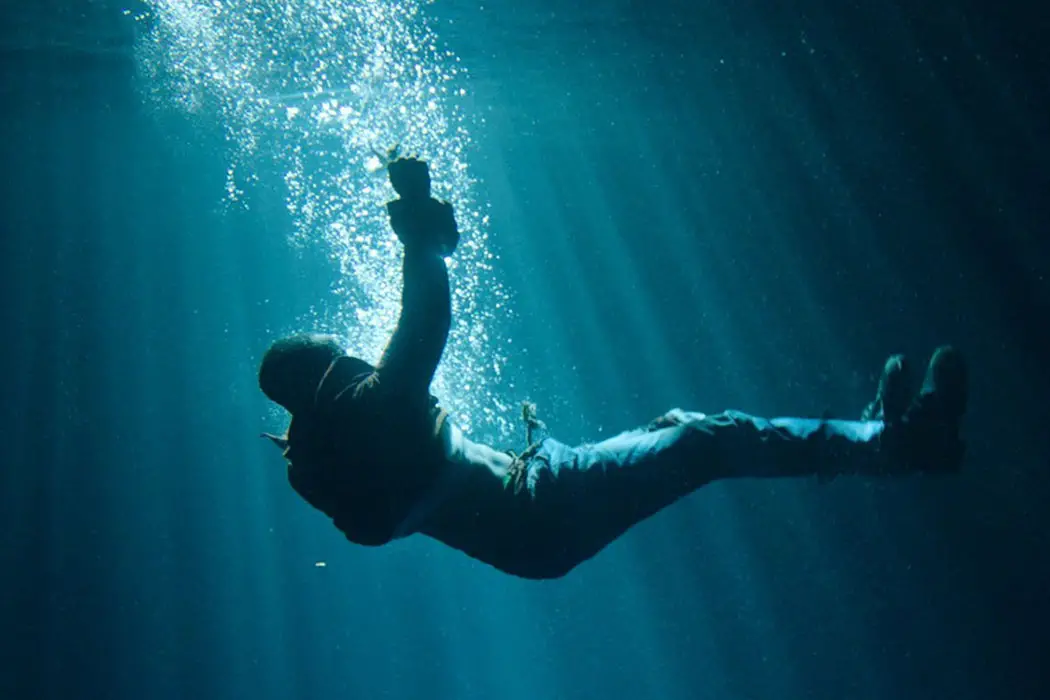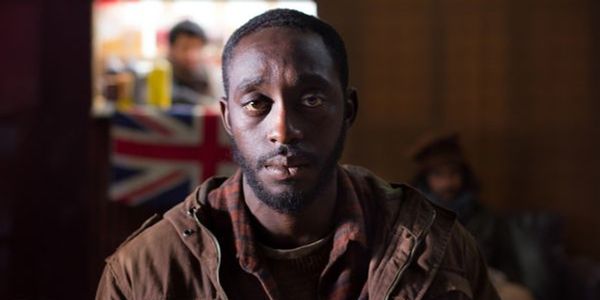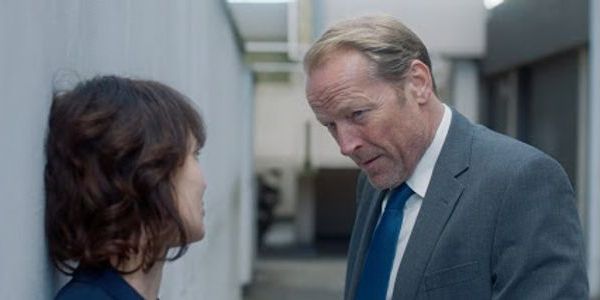THE FLOOD: More Of A Drip Than A Flood

Former film student from Scotland turned writer and film reviewer.
As the opening credits of The Flood begins we’re told that around 70 million people (roughly equivalent of the population of Britain and Ireland) around the world are forcibly displaced from their home countries by war, persecution, and conflict. Of those, over 18,000 have died attempting to reach Europe in the last 5 years. It is a shocking statistic, and sets the tone for what is to come. Unfortunately The Flood doesn’t quite manage to live up to this brutal premise; as contentious and relevant as this issue is, there’s an argument to be made that director Anthony Woodley pulls his punches a little too often for this to have the impact you feel it was going for.
The narrative structure centres around Haile (Humans’ Ivanno Jeremiah) an Eritrean solider forced to flee his homeland after refusing orders to kill a civilian trying to escape over the border. We first meet Haile in Dover, as he leaps from the back of a truck he was hiding in and attempts to attack the police officers who have discovered him. This act is central to The Flood as Haile is “interviewed” by immigration officer Wendy (Lena Headey) and her stressed out boss Philip (Headey‘s Game of Thrones co-star Iain Glen). As Haile’s attack on the police officers has become front page news, Wendy and Philip are under pressure from the Home Office to come down hard on him; Haile’s aggression suggests to them he may be a terrorist of some kind.
Headey plays Wendy as frustrated and no nonsense, barely pausing to look her interviewees in the eye as she glibly asks personal questions while taking notes. She has become so detached from the process that she seems unable to see her subjects as real people – you get the sense she has rejected their applications before they’ve had a chance to open their mouths. This means she meets her quotas easily and has become one of the top immigration officers in the country. She is chosen to interview Haile because, it is implied, she is the least likely person to accept his application for asylum.
Haile, though, is open about his experiences and conversational from the outset (“Your name is Wendy?” he asks, “it is my mother’s name”, to which Wendy retorts “of course it is”). Slowly, he starts to get through Wendy’s tough exterior. Throughout the interview Haile explains his journey to Wendy and Philip and we see flashbacks of that harrowing journey, from his escape from Eritrea to his landing in Italy to his experiences in the infamous Jungle refugee camp in Calais (Woodley and his writing partner here Helen Kingston were inspired to write this story after they visited the camp themselves) to his fateful meeting with the police officers who found him. On the way The Flood aims to show its viewers just how much refugees are willing to sacrifice and suffer so that they might find peace.
“There Is No Legal Way”
Although there are some different aspects covered here, what The Flood seems most preoccupied with is the plight of refugees. It’s a difficult ground to cover: should we have borders? How should we treat immigrants who come to a country already struggling to take care of its own? The kind of issues which have fuelled Brexit and turned the United Kingdom into a land of chaos are front and centre here, and there are no easy answers. Still, it’s hard to feel like the right balance was struck. As Haile Jeremiah does well; he is vulnerable and warm enough for the viewer to empathise with him, and behind all that we can see the hurt and pain he’s been through.
Often in flashbacks he is silent and you can feel the rage simmering in him. Those moments where he sits and stares can convey much more than his dialogue does at times. He makes the point to Wendy that when you need to cross borders, the only people who can help are dangerous people. Wendy points out that he crossed the border illegally to which Haile pointedly replies “there is no legal way”.

However, it’s perhaps a little too conventionally told. There are some obvious beats here (Wendy has a difficult home life – as seen through sparse conversations with her ex-husband and estranged child – and seems to have developed a drinking problem; while the “twist” behind Haile’s reason for attacking the police officers was too neat, and far too obvious, draining the moment of its intended dramatic purpose) and these beats undermine the seriousness of the subject matter. When we’re discussing the dilemma of immigration, do we really need a backstory about an immigration officer’s relationship with their spouse? It’s perhaps all too smoothly handled and for an issue as complicated and incendiary as immigration, it feels a little insulting.
Welcome to the Jungle
The intentions are good here. Haile’s story is a composite from real stories Woodley and Kingston were told during their time in the Jungle, and that experience is conveyed effectively. The Flood has clearly been well researched and while the peripheral characters might sometimes be a little too broad and cliche, Haile himself feels real; his journey is absolutely one you can imagine millions like him have made, and the struggles he overcomes is enough to will you to root for him. However, again, even this feels a little like emotional manipulation at times.
Without a reasonable backstop to Haile’s character his journey risks becoming something akin to tragedy porn; he is a good man trapped in terrible circumstances, and each chapter in his journey is bookended by heartbreaking statements such as when he reveals to Wendy that, by the time he reaches the Jungle, he has almost forgotten his own name – such is the amount of time that has passed since he was last asked for it. You get the feeling the purpose of Haile’s near-saintliness is to melt Wendy’s cold persona, but this belies the fact that Haile has made the same journey as millions of other refugees, each of whom are turned back by people like Wendy every day. Does this suggest only those of spotless character should enter the UK?

This is the essential problem with Headey‘s character, too. A film like The Flood suggests that it may excoriate a callous government for their utterly inept handling of the immigration issue. Yet Headey‘s character is burdened with her own (some would argue needless) backstory, drawing sympathy from an audience at a time when our sympathies should probably lie with the guy she is about to send to his death.
Philip, too, is portrayed as an exhausted, overworked middle man government official who is trying to appease his superiors (“the Home Secretary needs to be soothed” he tells Wendy at one point “and apparently the tone of my email was not suitably soothing”). This is effective in portraying the different aspects of this issue – Philip and Wendy are not bad people, just under a lot of pressure to deliver results at the implied cost of human lives – but it robs the viewer of any real antagonist, any suggestion of where the blame should lie for this issue and how we should move forward. In that way The Flood stays on the fence, refusing to come down on either since of the issue, which is strange for a film which starts off with such a strong implication and identity.
The Flood: Conclusion
Although it starts with a strong premise and seems to promise an unvarnished view of a topical, incendiary issue, ultimately The Flood’s refusal to pick a side robs it of any real purpose. This coupled with the often-cliched, sometimes perfunctory narrative, and surplus character backstories that don’t really add much, make The Flood a fairly middle of the road thriller. It is, in the end, enjoyable enough and has interesting points to make, but doesn’t do enough to drive these points home and push the viewer to question how we make these choices and what happens to those who don’t make the cut.
The Flood tries to tell a story about a very real and pressing issue. How do you feel stories such as the refugee crisis should be told? Let us know in the comments below.
The Flood was released in the UK on 21st June 2019, and will be released in the US on 1st May 2020. For more information on release dates, please click here.
https://youtu.be/jXcm57HguAA
Does content like this matter to you?
Become a Member and support film journalism. Unlock access to all of Film Inquiry`s great articles. Join a community of like-minded readers who are passionate about cinema - get access to our private members Network, give back to independent filmmakers, and more.













